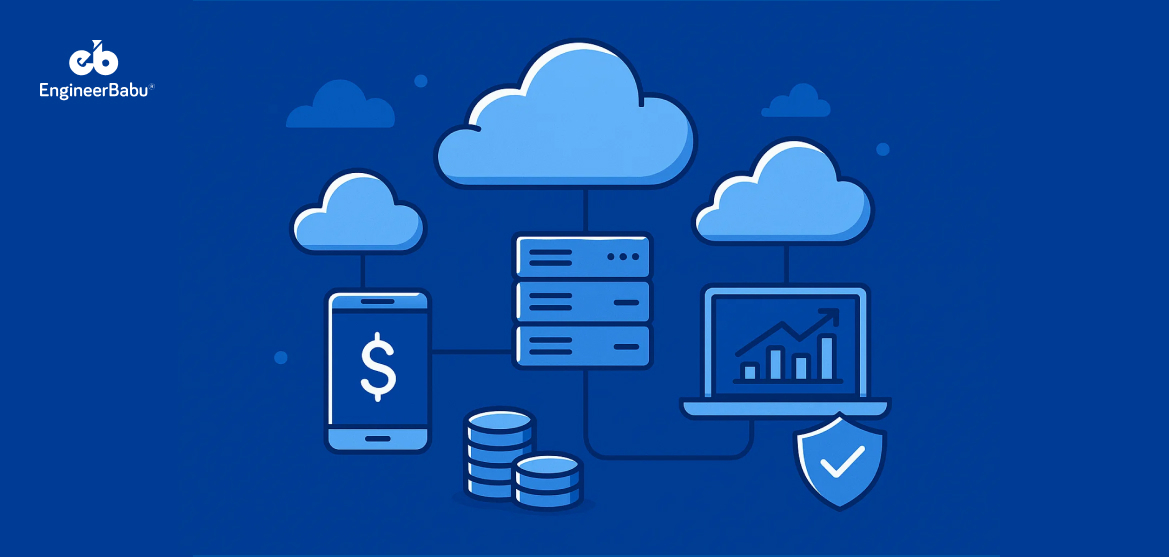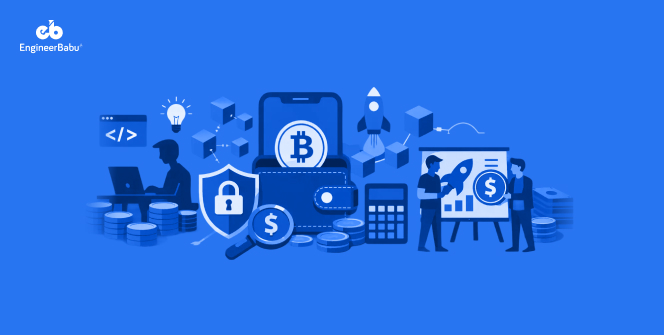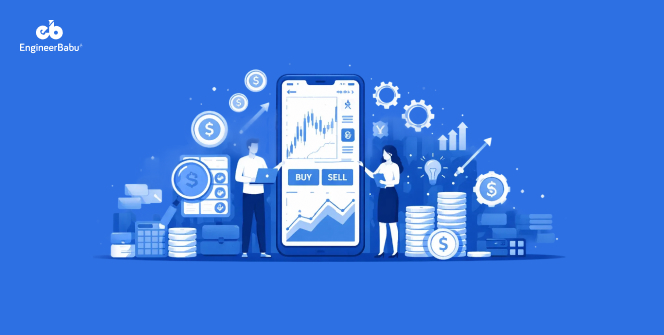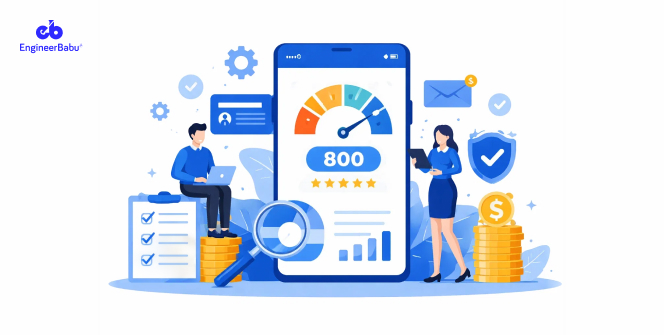Fintech apps live or die by speed, security, and the ability to evolve overnight, and the cloud delivers on all three. Behind every seamless payment, instant lending decision, or portfolio tweak powered by AI, there’s a cloud platform doing the heavy lifting.
It’s no longer optional for fintechs to be cloud-native, it’s now essential.
Here’s why: across financial institutions, banks, insurers, and asset managers, 84% now recognize cloud and edge computing as central to their operations, as per McKinsey. In fact, 60% report that over a quarter of their workloads are already running in the cloud, and that number is rising fast.
With this as the backdrop, choosing the right cloud provider isn’t just about price or uptime. It shapes how quickly your product gets to market, how cleverly you can automate fraud detection, and how easily you stay on the right side of compliance. Therefore, we have covered the 7 best cloud providers for fintech apps.
Key Factors When Choosing the Best Cloud Provider for Fintech Apps
The decision to pick a cloud provider goes beyond ticking a checklist. For fintech companies, it often defines how secure, scalable, and competitive their products will be. Let’s look closely at the factors that matter most when evaluating providers.
Security and Compliance
In fintech, customer trust is everything. A single breach or compliance failure can cause reputational damage that takes years to recover from. That’s why your provider must support financial industry standards such as PCI DSS Compliance for payments, SOC 2 for data handling, and GDPR for privacy.
Many leading providers also offer built-in compliance frameworks tailored to banks and payment institutions. Instead of building security controls from scratch, you get a platform where encryption, access management, and monitoring tools are already integrated.
Scalability and Performance
Fintech apps often experience unpredictable spikes in usage. Think about payday loan platforms on salary days or stock trading apps during market volatility. If your infrastructure cannot handle sudden surges, users face downtime at the worst possible moment.
Cloud providers solve this by offering auto-scaling, global data centres, and low-latency connections. That means your app can expand to meet demand instantly and scale back when activity slows, keeping costs under control without compromising performance.
Cost Efficiency
Cloud costs can become a burden if not managed carefully. Most providers follow a pay-as-you-go model, but the details vary widely. Some offer reserved instances that reduce costs for long-term usage, while others provide credits or discounts for startups.
Beyond raw pricing, cost efficiency also depends on how effectively the provider helps you monitor and optimise workloads. Tools like cost explorers or billing alerts can highlight inefficiencies before they spiral into budget overruns.
Integration and Ecosystem
A fintech app rarely runs in isolation. You may need fraud detection powered by AI and ML in fintech, big data analytics for customer insights, or APIs to connect with banking systems. The strength of a provider’s ecosystem often determines how fast you can innovate.
For instance, providers with robust AI/ML offerings enable you to build predictive models without hiring a full team of data scientists. Others may offer pre-built financial APIs that cut down integration time significantly. A strong ecosystem can accelerate development cycles and open doors to features that set your app apart.
Global Availability
Fintech is inherently global. Even if you launch in one country, expansion to new markets is often part of the growth plan. Choosing a provider with widespread data centres ensures that your app remains fast and compliant with local data residency laws.
A payment app serving customers in Asia needs low-latency infrastructure in that region. Similarly, European regulations may require data to be stored locally. Global availability is not only about performance but also about maintaining compliance and building user trust across borders.
7 Best Cloud Providers for Fintech Apps
Amazon Web Services (AWS)
AWS is one of the most trusted cloud platforms for fintech, offering unmatched scale and security. Its compliance portfolio includes PCI DSS, SOC, and GDPR, which makes it easier for financial apps to meet strict regulatory standards.
Why fintechs choose AWS:
- Scalability: Auto-scaling and global availability zones handle sudden spikes, such as trading surges or seasonal payment volumes.
- Compliance-ready: Built-in security frameworks reduce the time and cost of meeting industry regulations.
- Innovation tools: Services like Amazon SageMaker (AI/ML), Kinesis (real-time monitoring), and Macie (data protection) help fintechs move beyond infrastructure and build smarter applications.
Notable adoption: Robinhood and Coinbase use AWS to power trading at scale, proving its ability to handle both traditional finance and emerging crypto workloads.
Best for: Fintechs needing global reach, strong compliance support, and advanced data services.
Microsoft Azure
Microsoft Azure is a strong contender among the best cloud providers for fintech apps, especially for companies that value security and hybrid cloud flexibility. Azure’s compliance portfolio covers over 90 certifications, including PCI DSS, ISO, and GDPR, which makes it a reliable option for regulated financial services.
Why fintechs choose Azure:
- Hybrid capabilities: Seamless integration with on-premises systems is valuable for banks and fintechs working with legacy infrastructure.
- Data and AI services: Tools like Azure Synapse Analytics and Azure Machine Learning help improve risk analysis, fraud detection, and customer insights.
- Security-first approach: Azure’s built-in identity and access management safeguards sensitive financial data.
Notable adoption: Global banks and financial institutions, including HSBC, use Azure for digital transformation and advanced analytics, showing its reliability in high-stakes environments.
Best for: Fintechs that need hybrid flexibility, deep compliance coverage, and powerful analytics.
Google Cloud Platform (GCP)
GCP is known for its strengths in data, AI, and machine learning, making it a popular choice for fintech startups that want to build intelligent, data-driven applications. Its compliance certifications cover PCI DSS, SOC, and GDPR, giving fintechs the regulatory support needed to handle sensitive transactions securely.
Why fintechs choose GCP:
- Data and AI expertise: Tools like BigQuery and Vertex AI enable real-time analytics, predictive modelling, and fraud detection without heavy infrastructure management.
- Competitive pricing: GCP’s flexible pricing models and sustained-use discounts make it attractive for fast-growing startups.
- Global reach: A network of data centres ensures low-latency services for international fintech users.
Notable adoption: Companies like PayPal and Monzo have leveraged GCP for advanced analytics and to scale services globally.
Best for: Fintechs prioritising advanced data capabilities, AI-driven innovation, and cost efficiency.
IBM Cloud
IBM Cloud has carved a niche by tailoring its services for financial institutions, making it one of the best cloud providers for fintech apps that operate in highly regulated environments. Its Financial Services Cloud comes with built-in compliance controls, reducing the complexity of meeting industry standards like PCI DSS and GDPR.
Why fintechs choose IBM Cloud:
- Compliance-first design: Pre-configured frameworks specifically address the regulatory needs of banks and fintechs.
- Hybrid and multicloud flexibility: With Red Hat OpenShift, fintechs can modernize applications while still connecting to existing systems.
- AI and analytics: IBM Watson tools enable smarter risk assessment, customer insights, and fraud detection.
Notable adoption: Institutions such as BNP Paribas and other global banks trust IBM Cloud for mission-critical workloads, proving its reliability for high-security use cases.
Best for: Fintechs focused on compliance-heavy operations, hybrid environments, and AI-driven decision-making.
Oracle Cloud Infrastructure (OCI)
OCI is designed with performance and enterprise-grade security in mind, making it a strong option for fintechs handling high-volume transactions. Its architecture focuses on predictable performance and cost efficiency, which helps teams scale without surprise expenses.
Why fintechs choose OCI:
- High-performance computing: Optimized for applications that demand fast processing, such as payment gateways and trading platforms.
- Robust database services: Oracle’s expertise in databases supports secure and efficient transaction management at scale.
- Integrated security: Features like data encryption by default and identity management safeguard financial data.
Notable adoption: Companies like Nomura Research Institute and other financial leaders use OCI for large-scale digital transformation, showing its strength in handling mission-critical workloads.
Best for: Fintechs that need strong database performance, reliable transaction processing, and enterprise-grade scalability.
Salesforce Financial Services Cloud
Salesforce brings a customer-first approach to the table, and its Financial Services Cloud is built specifically for banks, insurers, and fintechs. Unlike general-purpose platforms, it focuses on customer relationship management while meeting strict compliance standards, making it stand out among the best cloud providers for fintech apps that prioritize user experience.
Why fintechs choose Salesforce:
- Pre-built financial tools: Tailored dashboards and workflows help teams manage customer journeys, from onboarding to loan servicing.
- Regulatory alignment: Built-in data security and compliance frameworks reduce the complexity of staying audit-ready.
- Personalized experiences: AI-driven insights and predictive analytics enable fintechs to deliver more relevant financial services.
Notable adoption: Financial service firms worldwide use Salesforce to unify customer data and deliver seamless digital experiences, proving its value beyond just infrastructure.
Best for: Fintechs focused on customer engagement, CRM-driven growth, and integrated compliance features.
Alibaba Cloud
Alibaba Cloud has become a major player in Asia-Pacific and is expanding its global presence, making it a strong option for fintechs targeting emerging markets. Its competitive pricing and wide range of services help startups and growing companies scale without heavy upfront investment.
Why fintechs choose Alibaba Cloud:
- Scalability in fast-growth regions: Strong infrastructure in Asia ensures low-latency services for millions of users.
- Compliance and security: Certifications like PCI DSS and ISO support fintechs handling sensitive financial data.
- Digital finance solutions: Pre-built tools for payments, risk control, and big data analytics accelerate fintech product development.
Notable adoption: Companies like Ant Financial have leveraged Alibaba Cloud to manage massive transaction volumes, showcasing its strength in high-scale financial ecosystems.
Best for: Fintechs targeting Asia-Pacific markets, cost-conscious startups, and companies looking for rapid global expansion.
Comparison Table: Cloud Providers for Fintech Apps
Choosing the right provider becomes easier when you see the strengths side by side. The table below highlights how the seven leading platforms compare across critical factors like security, scalability, pricing, and ideal use cases.
| Cloud Provider | Security & Compliance | Scalability | Cost Efficiency | Best For |
| AWS | Extensive (PCI DSS, SOC, GDPR) | Excellent global scaling | Complex pricing, strong monitoring tools | Global fintechs needing advanced data & AI |
| Microsoft Azure | 90+ certifications, strong compliance | Strong hybrid scaling | Flexible with reserved options | Hybrid fintech models and analytics |
| Google Cloud (GCP) | PCI DSS, SOC, GDPR | Reliable global infrastructure | Competitive pricing with sustained-use discounts | Data-driven fintechs, AI/ML heavy apps |
| IBM Cloud | Compliance-first with FS Cloud | Flexible hybrid/multicloud | Tailored for enterprise workloads | Fintechs in regulated industries |
| Oracle Cloud (OCI) | Strong encryption & compliance | High-performance computing | Predictable pricing | Transaction-heavy fintechs |
| Salesforce FSC | Built-in compliance for finance | CRM-focused scalability | Subscription-based | Fintechs prioritizing customer engagement |
| Alibaba Cloud | PCI DSS, ISO certifications | Excellent in Asia-Pacific | Competitive pricing | Startups and fintechs in emerging markets |
Conclusion
The cloud has become the backbone of modern financial technology. From secure payment gateways to AI-driven fraud detection, the right provider can make a difference. Each of the platforms discussed, AWS, Azure, GCP, IBM, Oracle, Salesforce, and Alibaba, brings unique strengths to the table.
The best choice depends on your priorities, whether that’s compliance, scalability, customer engagement, or cost efficiency.
At EngineerBabu, we’ve worked closely with fintech companies to navigate these choices and implement cloud solutions that are not only secure but also built to grow. Our team can help you with cloud security, integration, and optimisation of your cloud infrastructure so your app is ready for the demands of a fast-changing market.
Let’s talk about how our expertise can support your vision. You can start by hiring dedicated fintech developers with us and ensure your app is in the right hands from day one.
FAQs on Cloud Providers for Fintech Apps
1. Why is cloud adoption critical for fintech companies?
Cloud adoption allows fintechs to scale quickly, reduce infrastructure costs, and access advanced tools like AI and machine learning. More importantly, it provides built-in security and compliance frameworks that help meet strict regulatory standards without building everything from scratch.
2. Which cloud provider is the most secure for fintech apps?
Several providers, including AWS, Microsoft Azure, and IBM Cloud, offer strong compliance certifications like PCI DSS, SOC, and GDPR. The “most secure” choice depends on your region and regulatory needs, but all leading providers have dedicated financial services offerings designed for high-security workloads.
3. Can fintech apps use multiple cloud providers at once?
Yes, many fintech companies adopt a multi-cloud or hybrid approach. This reduces dependency on a single vendor, improves resilience, and allows teams to choose the best provider for specific workloads such as analytics, payments, or customer engagement.
4. How do cloud providers help with compliance in fintech?
Top providers offer pre-configured compliance frameworks, encryption tools, and continuous monitoring services. This simplifies adherence to regulations like GDPR in Europe or PCI DSS for payment systems, saving fintech teams significant time and cost.
5. Why should I partner with EngineerBabu for cloud-enabled fintech development?
EngineerBabu combines deep fintech expertise with cloud integration skills to deliver secure and scalable solutions. Our team has helped startups and enterprises streamline compliance, enhance security, and accelerate growth using the right cloud strategies.




